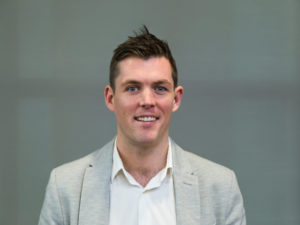Michael Monaghan is Assistant Professor in Biomedical Engineering in the Department of Mechanical and Manufacturing and Biomedical Engineering, Trinity College Dublin. Prior to this appointment he was a Postdoctoral Researcher at Eberhard Karls University Tübingen, Germany, following a Marie Curie Postdoctoral Fellowship in the Fraunhofer Institute for Interfacial Engineering and Biotechnology in Stuttgart Germany. His group at Trinity College Dublin focus on the reprogramming of stem cells in vitro using smart biomaterials, bioreactors and cardiomyogenenic extracellular matrices. His lab is also focused on the use of non-invasive microscopy to evaluate extracellular matrix and cell metabolic dynamics (metabolimaging). He can be found on Twitter @drmgmonaghan.
Read Michael’s Emerging Investigator article “Structural crystallisation of crosslinked 3D PEDOT:PSS anisotropic porous biomaterials to generate highly conductive platforms for tissue engineering applications” and check out all of the 2021 Biomaterials Science Emerging Investigator articles here.
How do you feel about Biomaterials Science as a place to publish research on this topic?
I always enjoy reading the work in this journal which is always timely and rigorously reviewed to ensure high standard pieces of work. I have often reviewed for the journal and found that the initial submissions sent on are of high quality. For me, the greatest strength of the journal is its editorial board and peer review policies.
What aspect of your work are you most excited about at the moment and what do you find most challenging about your research?
The work I am most excited the higher-risk projects in the group that keep us questioning. I have a great team of researchers and it is their innovation, curiosity and unexpected results that gets me most excited. I feel that we are always close to the pulse of the developments of our field, more now than ever due to social media (twitter etc.) and online events. The most challenging aspect is maintaining momentum through funding support and maintaining continuity in skills within the group.
In your opinion, what are the most important questions to be asked/answered in this field of research?
I believe we need clever (not complicated!) solutions to advance healthcare and understand disease better. We need to learn from nature, but I also think we need to increase our awareness of nature and look to be more environmentally sustainable (and realistic) in our approaches.
Can you share one piece of career-related advice or wisdom with other early career scientists?
This will sound cliché but do keep trying and always keep your options open (don’t close any doors). There are plenty of people that want you to succeed so do listen to their advice. And choose your battles.











